#Duchy of Lancaster
Explore tagged Tumblr posts
Text

Flag of the Duchy of Lancaster
19 notes
·
View notes
Note
Nobody can change my mind that the exclusives being drip fed to the media by KP isn’t payback for the Rota not looking too closely or reporting too loudly on Cathy’s “cancer” and it’s nonsensical timeline and “treatment”.
Also that all these briefings from KP to the press about how the laziest middle aged royals are the greatest small r’s to ever royal, isn’t the reason why the entire family seems to barely tolerate them these days.
That media who would criticize Charles for breathing air, can publish headlines like this with a straight face when the only change Willy has made to the Duchy is to…reduce transparency into its finances:

People criticize Harry all day long but never have that same energy when Willy does interviews like this but will NEVER recognize or praise the work his father has done or the time he took to educate this ungrateful brat.
He comes across as a dilettante in these sound bites. No wonder Alastair Martin, who first revealed Willy trying to run the Duchy by WhatsApp, jumped shit and when to work for the King at the Duchy of Lancaster the first chance he got!
Do you think there’s some danger of the Streisand effect here? The comments aren’t buying this so why do they keep bringing up this topic and reminding people about the vast wealth you’ve inherited, when you have nothing to show for that priviledge?

I haven't read Hannah Furness's piece in The Telegraph in its entirety yet, but it hits notes that likely aren't going to age well in the near future, such as this:
It is surprising, even to a royal editor, to learn how much William manages to do without the wider world noticing. He films and sends regular video messages for Duchy-related events – a river conservation meeting this month, a charity boxing night. When a tenant suggested he might be interested in the agricultural festival Groundswell, he duly popped up there.
"Without the wider world noticing"? How is it that the "wider world" didn't notice when he was actually photographed at Groundswell last year? And insinuating that "the wider world" doesn't notice what you do is NOT a good look when you already have a reputation for secrecy, like Will & Kate.
Kate Middleton and Prince William's desire for privacy has been even more zealously guarded as the Princess of Wales continues cancer treatment. "It is really impressive how they are still able to command all this secrecy," royal historian Amanda Foreman tells PEOPLE exclusively in this week's cover story. "They are totally running this."
Doing things outside of the disinfecting rays of sunlight is par for the course for Will & Kate, which is why they ended up in such a huge problem last year and are about to get in trouble again. It's not really that the "wider world" didn't notice; it's that William and THE KP TITANIC choose not to communicate things appropriately, such as how much tax William allegedly pays.
Prince William has refused to reveal what he paid in taxes for the 2023-2024 financial year — breaking his father King Charles’ tradition which spanned more than 30 years. The Prince of Wales, 42, inherited the Duchy of Cornwall estate worth over $1 billion when his father assumed the throne in Sept. 2022. In addition to the tax-exempt estate, the father of three was given the Duke of Cornwall title. But William took a different approach from his father when it came to disclosing finances to the general public, as the prince declined to disclose how much he paid in taxes in his first full year as next in line to the throne. It’s understood that William paid a standard UK tax rate unspecified household expenses were deducted from the bill. However, he did not publicize the amount. This is a stark contrast to his father, who voluntarily began disclosing how much tax he paid each year since 1993, Hello! reported. Before handing over the estate’s reins to William, Charles shared that he paid more than $6.4 million in taxes from the Duchy of Cornwall for the year ending in 2021 and $7.5 million the following fiscal year, The Telegraph reported.
In an interview with The Telegraph's Royal Editor Hannah Furness, who spent a day travelling alongside the Prince of Wales, 42, as he visited his tenants, the royal shared how he was modernising the land and property empire. This includes encouraging people involved with the Duchy to speak openly, with the Prince telling his staff to 'please give [everyone] proper authority to say what’s really going on. Not being polite because I’m in the room,' ahead of a meeting in Dartmoor. Elsewhere, Matthew Morris, the rural director of the Duchy, revealed how employees 'no longer feel the need to put on a tie when the Duke of Cornwall is in town' - perhaps unlike when Charles - who is often smartly dressed in a full suit - visited. The publication also noted how William will communicate with staff via WhatsApp and ask questions over the social media platform in order to keep updated.
The non-serious nature of how William conducts himself is always jarring when you consider a famous anecdote about the Queen Mum dressing up to visit people someplace--perhaps during WWII & the Blitz--where they weren't able to wear their Sunday best to greet her. Someone asked the Queen Mum, when she was still the reigning queen consort, why she dressed up to see them when they themselves weren't dressed up? She responded that they would all be dressed up if they came to see her at Buckingham Palace, so she could hardly disrespect them by doing the same, i.e. dressing up nicely.
And then there's William who is allergic to a suit and tie unless it's part of the engagement dress code.
While the role has historic roots, Prince William communicates about the Duchy of Cornwall on WhatsApp. "The day after Her Late Majesty [Queen Elizabeth] died, I rang Prince William to say, 'Welcome to your duchy, Sir.' I obviously knew him, I’d been working with him for the previous eight years or 10 years to really explain to him what his future was during the time he was heir to the throne," said Alastair Martin, outgoing secretary and keeper of the records, according to The Times. "And he said, 'I'm going to give you my mobile telephone number — if you want me, just get me, just message me," Martin said. "And that’s how he works, and he is very involved." "There will be weekends when my WhatsApp messages will be in double figures, and I will be very responsive," Martin continued. "If something has gone well or badly, I will want to tell my boss, and he’ll be straight back."
And WhatsApp messages automatically delete after 24 hours unless you've specifically chosen to keep them. But it's not surprising that William--who values his privacy secrecy above all else--would choose a communication application where his employees have to spend their weekend time answering his questions at William's leisure, instead of enjoying their weekends or responding to said questions during regular working hours on weekdays.
How is this different than Meghan and her 5 a.m. emails?
Yeah, it's not surprising that Alastair Martin ditched William & his WhatsApp messages for the Duchy of Lancaster.
Yeah, it's totally possible for this article to blow up in their faces. Everyone knows the Duchy of Cornwall exists to give the heir a fortune to live on. £23 million per year, is it?
So trying to act as if the Duchy of Cornwall is now a humanitarian organization????


William has NO IDEA what "real change" is for "improving people's lives."
He takes at least 20 weeks of vacation per year, which is something most people do not get.
He receives £20+ million per year, which is also something most people do not get.
So, yeah, William is Marie Antoinette-ing it up, just like his wife.
All talk, no action.
And totally out of touch with the plebes.







#ask#fleet street#hannah furness#jessica green#magazines#kensington palace#Propaganda Pushers#pr games#strategery#duchy of cornwall#duchy of lancaster#money money money#the campaign to save William as heir to the throne#queen mum#William sitting firmly on the STRUGGLE BUS#streisand effect#The Celebrity Activists also known as The Prince & Princess of Wales#the small r royal and his wife#my gif
6 notes
·
View notes
Text
I’ve been researching the Duchies of Cornwall and Lancaster since I was 14, these people reallly don’t want to fight with me today. 🙃🙃🙃
4 notes
·
View notes
Text
“The Duchy of Lancaster said: “His majesty the king voluntarily pays tax on all income received from the duchy.””
Well that’s good of him. We on the other hand are obliged to pay our tax bills.
A lack of transparency about their finances for institutions which receive public money and pay less tax than we are obliged to, eg inheritance and corporation tax, cannot go on.
4 notes
·
View notes
Text

5 February 2024

The King is being treated for cancer, Buckingham Palace has announced.
It has not said what type of cancer the 75-year-old has but confirmed that it was not prostate cancer. The King was recently treated for prostate enlargement.
King Charles III was crowned at Westminster Abbey in May 2023 alongside his wife, Queen Camilla.
How will the King's duties change while he is treated for cancer?
Buckingham Palace said:
"Regrettably, a number of the King's forthcoming public engagements will have to be rearranged or postponed.
His Majesty would like to apologise to all those who may be disappointed or inconvenienced as a consequence."
It said that he was receiving expert care and "looks forward to returning to full public duty as soon as possible."
While the King is recovering, the Queen is expected to continue attending engagements.
"Her Majesty will continue with a full programme of public duties," Buckingham Palace said.
Despite stepping back from public events, the King will continue with paperwork and private meetings as head of state.
What does the King do?
The King is the UK head of state, but his powers are largely symbolic and ceremonial, and he remains politically neutral.
He receives daily dispatches from the government in a red leather box, including briefings ahead of important meetings, or documents needing his signature.
The prime minister normally meets the King on a Wednesday at Buckingham Palace.
These meetings are completely private, and no official records are kept of what is said.
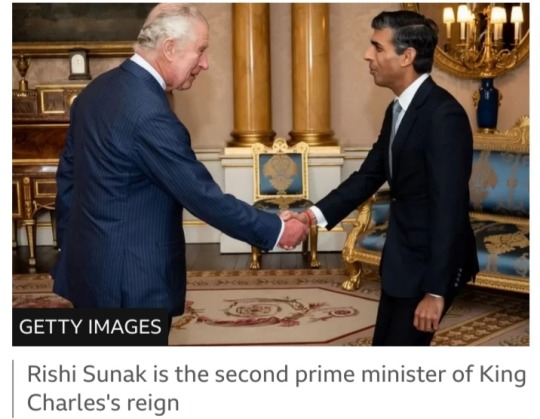
The King also has a number of official parliamentary roles:
Appointing a government — the leader of the party that wins a general election is usually called to Buckingham Palace, where they are invited to form a government. The King also formally dissolves Parliament before a general election
State Opening and the King's Speech — the King begins the parliamentary year with the State Opening ceremony, where he sets out the government's plans in a speech delivered from the throne in the House of Lords
Royal Assent — when a piece of legislation is passed through Parliament, it must be formally approved by the King in order to become law. The last time Royal Assent was refused was in 1708
In addition, the monarch leads the annual Remembrance event in November at the Cenotaph in London.
The King also hosts visiting heads of state, and regularly meets foreign ambassadors and high commissioners.
For his first state visit, Charles visited Germany, where he became the first British monarch to address the country's parliament, speaking in English and German.
The King then travelled to France for a three-day state visit in September and to Kenya for a four-day state visit in October, where he acknowledged the "abhorrent and unjustifiable acts of violence committed against Kenyans during their independence struggle."
He also delivered the opening address at the COP28 climate conference in Dubai in December, where he said: "The Earth does not belong to us."
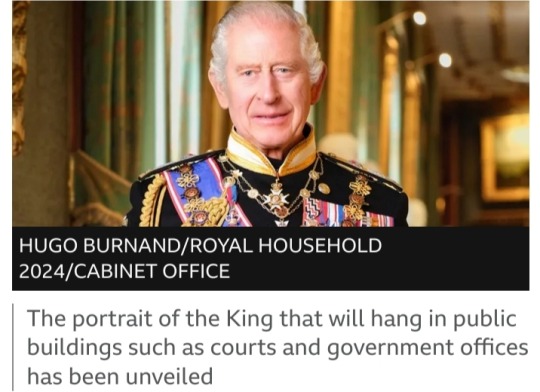
Charles is also head of the Commonwealth, an association of 56 independent countries spanning 2.5 billion people.
He is head of state for 14 of these, known as the Commonwealth realms, as well as the Crown dependencies - the Channel Islands and the Isle of Man.
The Queen supports the King in carrying out his work and undertakes her own public engagements on behalf of the 90 charities she supports.
Where does the Royal Family get its money?
The Royal Family receives an annual payment from the taxpayer, known as the Sovereign Grant, which is used to pay for official expenses, such as the upkeep of properties and staff costs.
The amount is based on a proportion of the profits of the Crown Estate, a property business owned by the monarch but run independently.
It had assets worth £16.5bn in 2022.
The Sovereign Grant was worth £86.3m in 2022-2023, the same as in 2021-2022.
But total spending for the year was £107.5m, a 5% increase on the £102.4m spent the previous year, with more than £20m drawn from financial reserves to cover the shortfall.
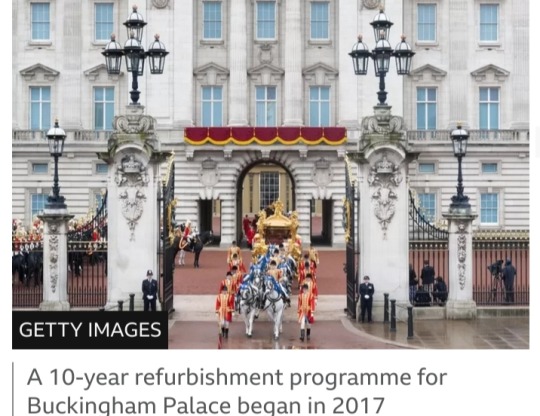
The King also receives money from a private estate called the Duchy of Lancaster, which is passed down from monarch to monarch.
It covers more than 18,000 hectares of land, including property in central London.
Worth £654m, it generates about £20m a year in profits.
The Duke of Cornwall (currently William, Prince of Wales) benefits from the Duchy of Cornwall, which mainly owns land in the south-west of England.
Worth £1bn, it generated a net surplus of £24m in 2022-23.
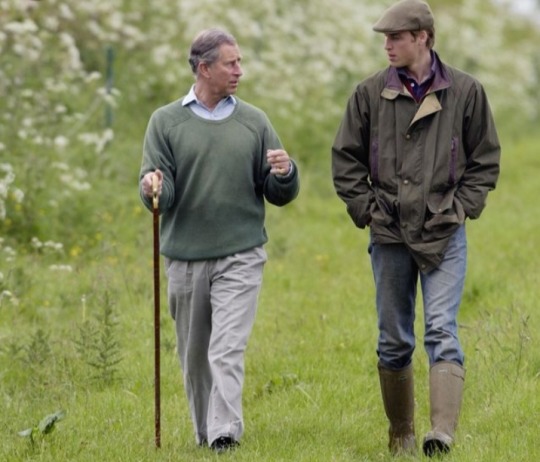
The King and Prince William receive the profits from the duchies personally, and can spend the money as they wish.
Both voluntarily pay income tax on the proceeds.
In addition, some other Royal Family members have private art, jewellery and stamp collections, which they can sell or use to generate income as they wish.
NOTE: Edited
#King Charles III#His Majesty The King#Prince William#British Royal Family#Queen Camilla#Buckingham Palace#red leather box#Commonwealth realms#Sovereign Grant#Crown Estate#Duchy of Lancaster#Duke of Cornwall
12 notes
·
View notes
Text
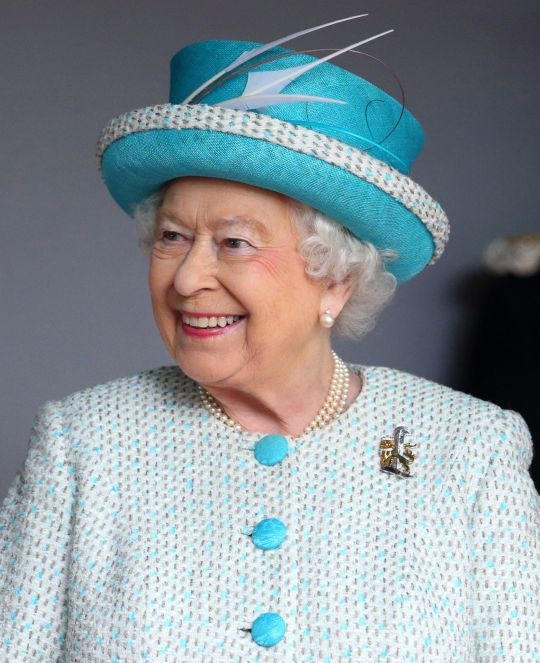
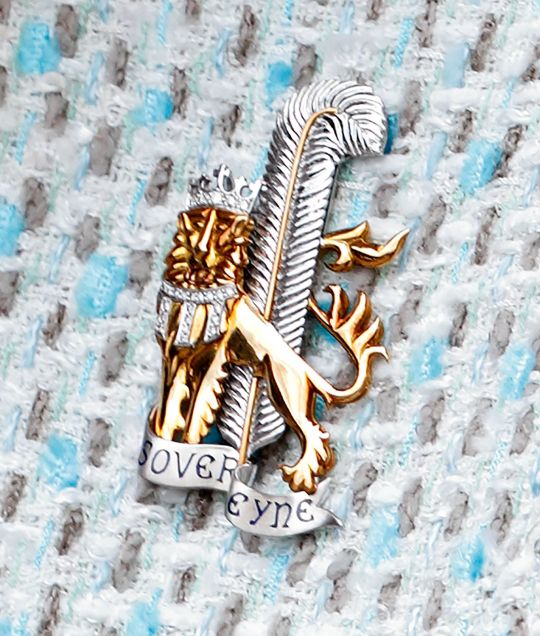
''The Duchy of Lancaster Brooch'' - HM Queen Elizabeth II
0 notes
Text
The Parliamentary Rolls record that in 1482, Elizabeth Woodville was granted “the wardships and the marriages of the heirs of her tenants of so much of the Duchy of Lancaster as she [held] to her own use.”
— Michele Seah and Katia Wright, “The Medieval English Queen as a Landowner”, Women and Economic Power in Premodern European Courts
#historicwomendaily#elizabeth woodville#is this part of the wardships policy for the Duchy of Lancaster he introduced in 1483? Seems like it#it's such a shame her queenship ended just a year later...it would've been interesting to see how she made use of this grant#15th century#english history#my post#queue
23 notes
·
View notes
Text
played crusader kings 3 so much on my day off that i started seeing dreams where i was forming political marriages and alliances between my mutuals....
#even after i woke up my first thought was#'quickly.. i must marry [redacted] off to the duchy of lancaster...'#truly making the mafuteru empire a reality#can we try this on my birthday...? please.. dont even worry about the morality and terrible consequences. i will manage it#shion.txt
10 notes
·
View notes
Text
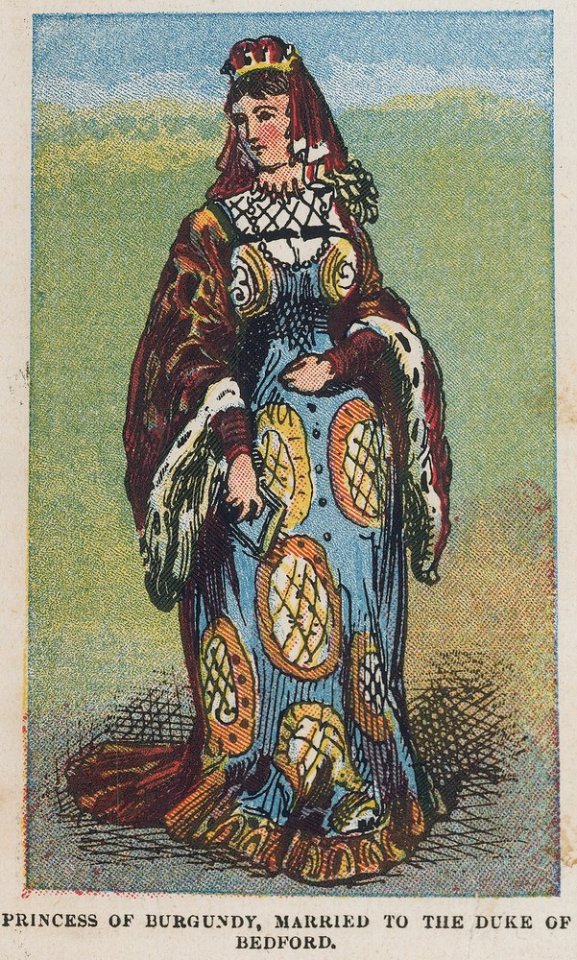
Anne of Burgundy, Duchess of Bedford (1404-1432).
She was a daughter of John the Fearless, Duke of Burgundy.
#royaume de france#maison de valois#duché de bourgogne#anne de bourgogne#duchesse de bedford#bourgogne#valois bourgogne#kingdom of england#duchess of bedford#duchy of bedford#bedford#full length portrait#john of lancaster#duke of bedford#full-length portrait
3 notes
·
View notes
Text
Pat McFadden and the Chancellor of the Duchy of Lancaster
The role that the Chancellor of the Duchy of Lancaster seems to fill is one that's simultaneously very important and yet has almost no responsibilities. While Raynor is the deputy leader of the Labour Party and deputy Prime Minister the Duchy of Lancaster is the second highest rank within the Government. And while historically there were responsibilities to the Duchy of Lancaster those have largely been usurped or delegated making the one that's primary responsibility is advisory to the cabinet, PM and King.
In some ways the role is one that mirrors the Speaker for the House, they're the one who chairs meetings and discussions and ensure all the business is brought to the table. Though as chairman they're permitted to have their own say and opinion in meetings a way that the Speaker is not as a representative of the whole house.
McFadden himself was a minister under Gordon Brown, and a Secretary of Tony Blair so his expertise as an advisor comes from his presence during the last Labour Government. He has also worked within the shadow cabinet in several positions giving him a fairly rounded outlook of the role of the cabinet.
This is one of those jobs that I don't really have any opinion about the appointment mainly because I can't really judge the role, it's not especially prominent to the public and the requirements are somewhat unintuitive.
0 notes
Text

So let me get this straight…
Virginia Giuffre, Jeffrey Epstein victim, survives a bus slam into her, despite being given just 4 days to live. Then, once she bravely claws her way back from the edge of death and on the road to recovery, she suddenly commits suicide? 👇

One of the first to speak out, Giuffre became a powerful force in the fight for justice against Epstein and his network.
Her courage inspired countless others to come forward, breaking the silence that had protected abusers for years. 👇
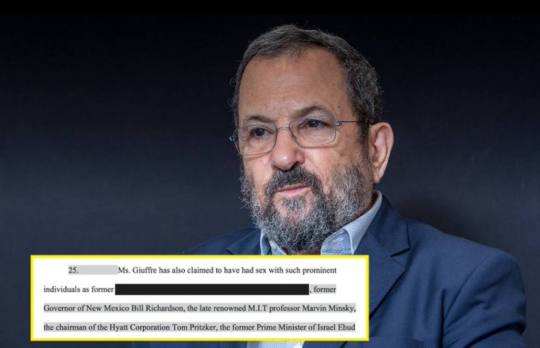
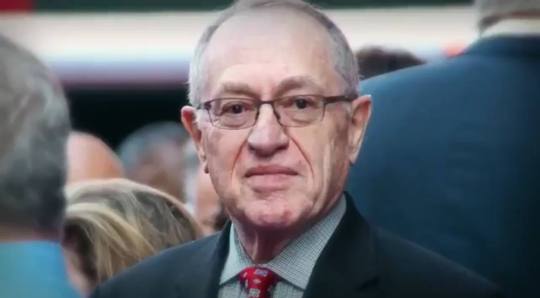

Virginia Giuffre claimed she was forced to have s*x with several powerful men—including former Israeli Prime Minister Ehud Barak.
The allegation was revealed by Alan Dershowitz, who cited her claims while attempting to undermine her credibility.
Giuffre also named Prince Andrew, New Mexico’s former Governor Bill Richardson, MIT professor Marvin Minsky, Hyatt chairman Tom Pritzker, and others.
Dershowitz sued Giuffre into silence. 👇
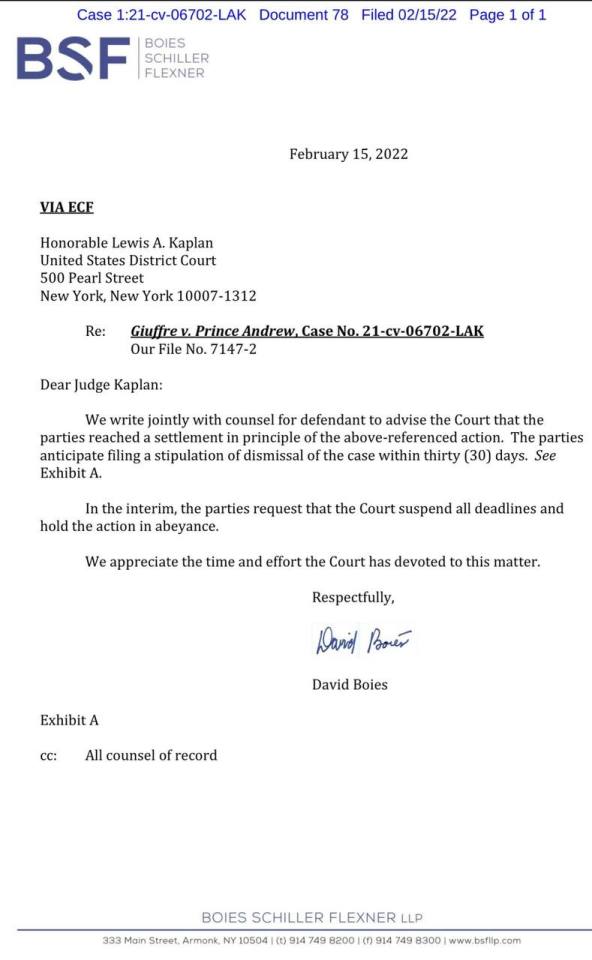
Just a reminder that the late Queen paid Virginia £12 million in an out-of-court settlement so that Andrew didn't have to face a jury trial on claims that he sexually abused and raped her when she was 17. 👇
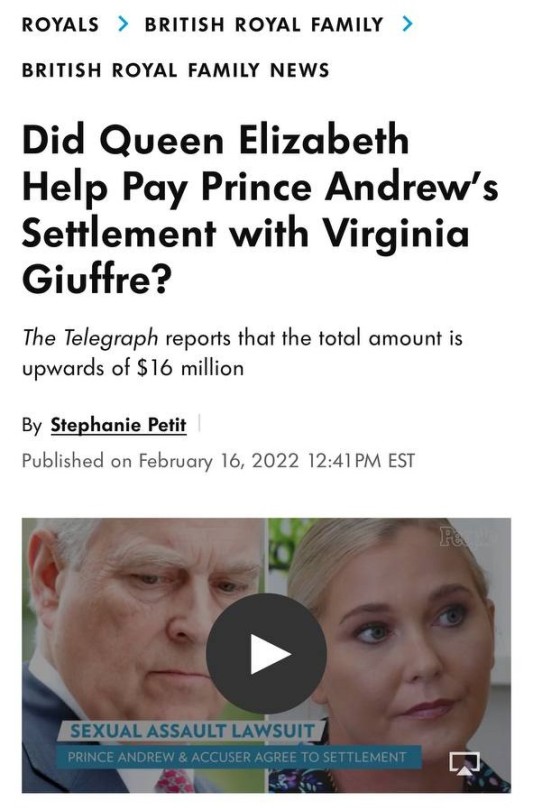
The Telegraph reported that the total amount was upwards of $16 million and included a contribution from the monarch from her private Duchy of Lancaster estate, which means it wouldn't be coming from taxpayers' money. (yeah right) 👇
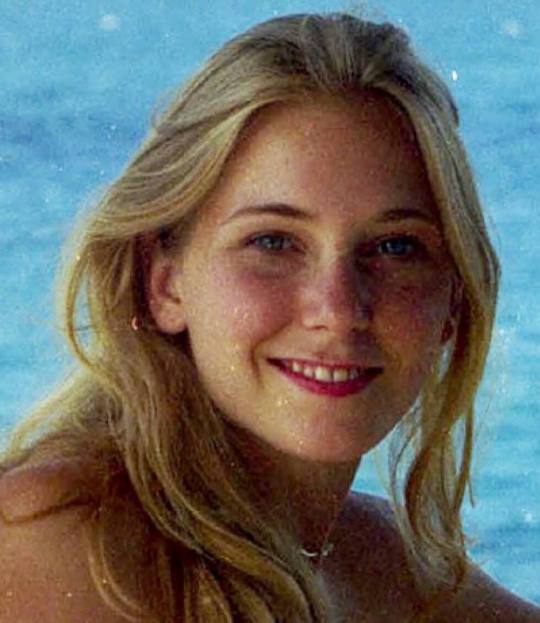
If true... May she R. I. P. 🙏
I AM seriously NOT be-LIE-ving this story 🤔
#pay attention#educate yourselves#educate yourself#reeducate yourselves#knowledge is power#reeducate yourself#think about it#think for yourselves#think for yourself#do your homework#do your own research#do some research#do your research#ask yourself questions#question everything#government lies#government corruption#government secrets#truth be told#lies exposed#evil lives here#news#stranger than fiction#stranger things#insane story#do you see it#do you understand#are you buying this#you decide
719 notes
·
View notes
Text
Fantasy Guide to Dukes and Duchesses
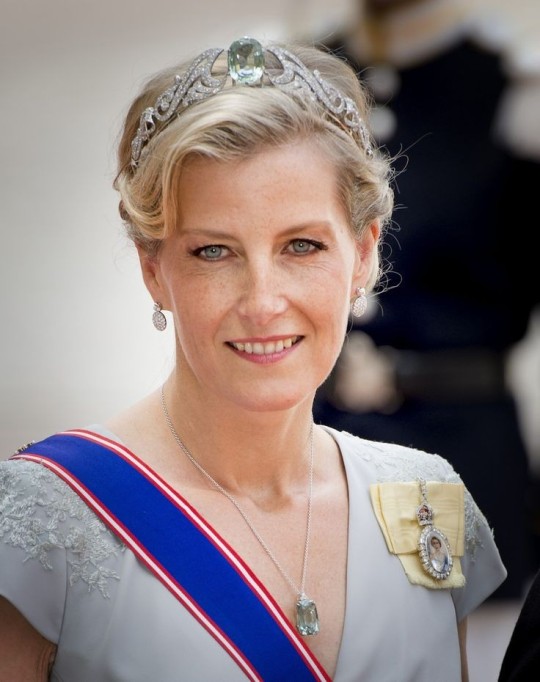
This new series will offer an indepth view of each noble title in the standard European hierarchy of noble titles. Here we will discuss what they are, their lands, their jobs and everything you need to know when writing them.
What is a Duke exactly?
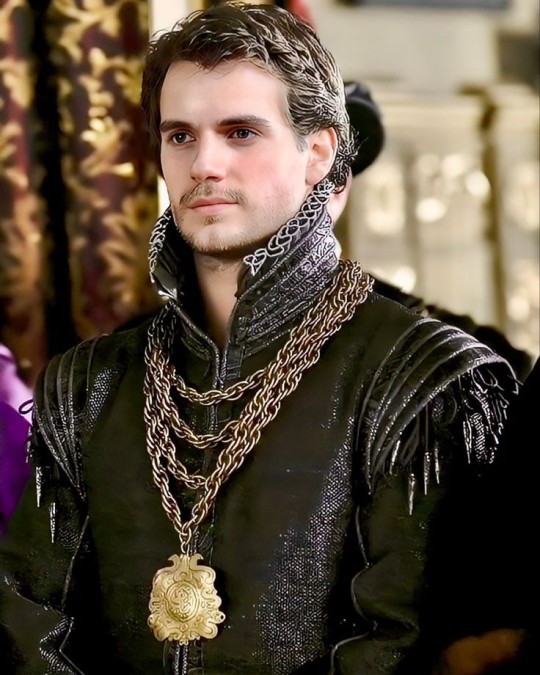
A Dukedom is the highest rank in most noble hierarchies. The Duke rules a section of land within the Kingdom known as a Duchy, for example the Duke of Lancaster or can be a standalone title, Duke of Rothesay. A Dukedom is inherited through the family line, from father to so but the title is bestowed on the by the monarch. Monarchs can also give their children Dukedoms, and often do. For example the second son of the King of France would be the Duc d'Orleans.
Titles, Titles
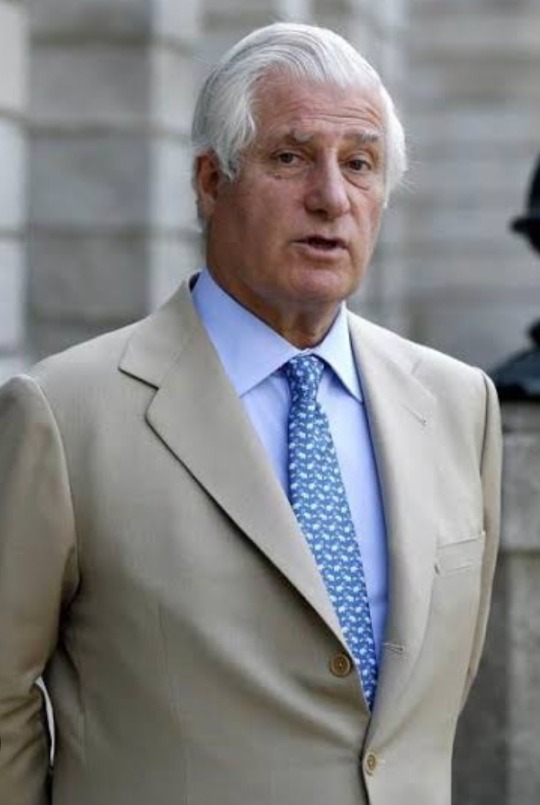
The Duke is the highest ranking in the land. They are the first among the nobility, among the wealthiest, with the most prestige. A Duke is referred to as 'Your Grace'. If one is meeting a Duke in a social setting, nobles would call them Duke whilst underlyings would call them "Your Grace". A Duke would also hold subsidiary such as an Earldom or two, a Barony or three. But would go by Duke as it is the highest title. Fun fact, Carlos Fitz-James Stuart (pic above) has the most titles:
He is: Carlos Fitz-James Stuart, Duke of Alba, Grandee of Spain, Duke of Berwick, Grandee of Spain, Duke of Huéscar, Grandee of Spain, Duke of Liria and Jérica, Grandee of Spain, Count-Duke of Olivares, Grandee of Spain,Marquess of Carpio, Grandee of Spain, Marquess of La Algaba, Marquess of Barcarrota, Marquess of Castañeda, Marquess of Coria, Marquess of Eliche, Marquess of Mirallo, Marquess of la Mota, Marquess of Moya, Marquess of Osera, Marquess of San Leonardo, Marquess of Sarria, Marquess of Tarazona, Marquess of Valdunquillo, Marquess of Villanueva del Fresno, Marquess of Villanueva del Río, Count of Lemos, Grandee of Spain, Count of Lerín, Grandee of Spain, Constable of Navarre, Count of Miranda del Castañar, Grandee of Spain, Count of Monterrey, Grandee of Spain, Count of Osorno, Grandee of Spain, Count of Andrade, Count of Ayala, Count of Casarrubios del Monte, Count of Fuentes de Valdepero, Count of Fuentidueña, Count of Galve, Count of Elves, Count of Modica, Count of San Esteban de Gormaz, Count of Santa Cruz de la Sierra, Count of Villalba, Viscount of la Calzada, Lord of Moguer.
The Family of the Duke
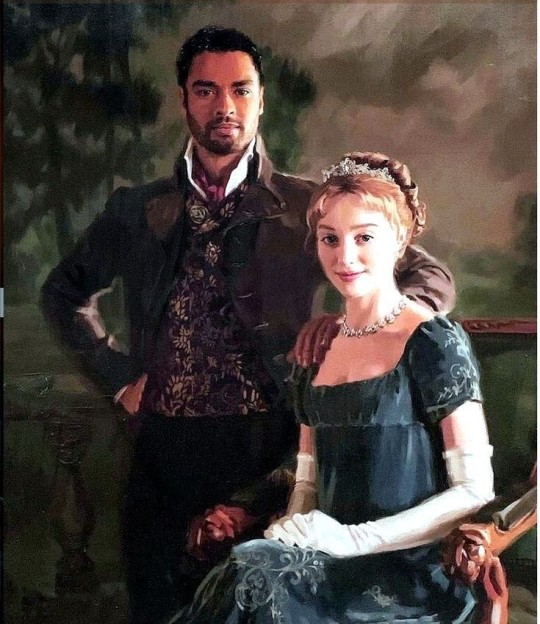
The wife of a Duke is a Duchess. If a Duke is married to a man, while there is no real world examples, I would personally say they would take one of those other subsidiary titles I mentioned above. Same thing with a ruling Duchess and her wife. However, a ruling Duchess's husband usually sticks with whatever title he came with. The heir of the Duke usually inherits their parent's next highest title, usually an Earldom. The other children are styled as Lord/Lady Firstname.
The Role of the Duke
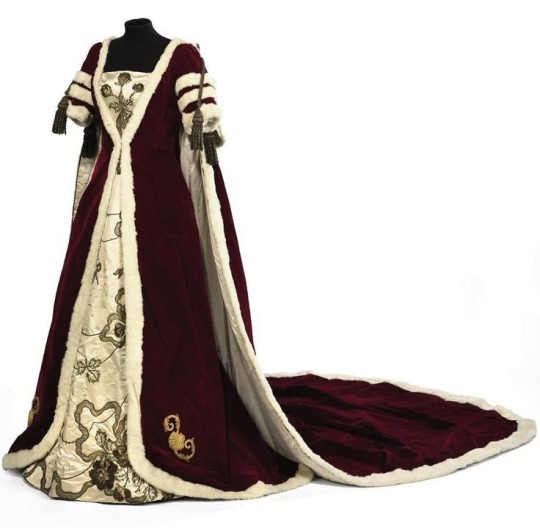
As the Duke is leader of the Duchy, which is a large section of the kingdom. They are in control of this section, the highest power in law and order, politics and all things in that section with only the monarch above. They handle administration at the highest level, raising troops from their duchy for the crown in times of war, see the collection of taxes and sometimes they might even advise the monarch if they are offered a place of the monarch's council. They would also attend the monarch at their coronation.
Cribs
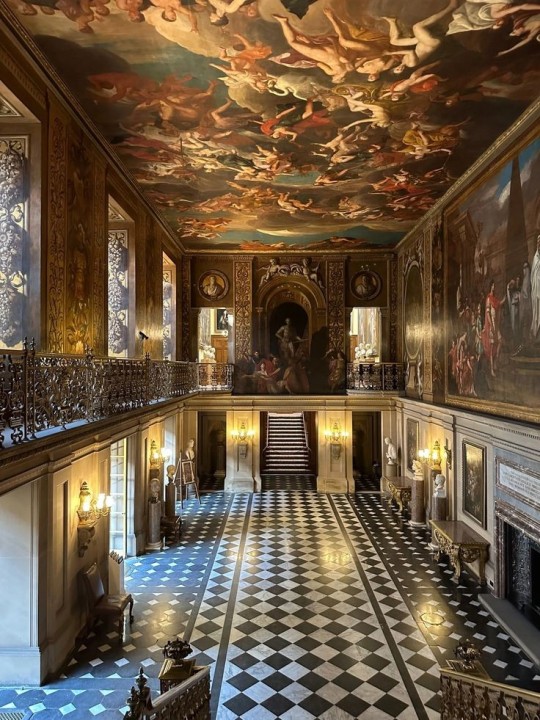
Dukes like a lot of nobility would have multiple houses, manors, estates etc. Their homes would be the grandest in the land and the social hubs for the Duchy and even the country. A Duke would sometimes live at court when invited but would also have the homes in the capital. This vast portfolio can become a source of income as the Duke can rent them out or a handy way to shelf relatives who depended on them.
#Fantasy Guide to Dukes and Duchesses#Dukes#Duchesses#Duke#Duchess#Fantasy Guide#Fantasy Guide to noblity#Nobles#Noble titles#Nobility#Titles#writing#writeblr#writing resources#writing reference#writer's problems#writer#writing reference writing resources#writing resources writing reference
426 notes
·
View notes
Note
I am hoping hoping hoping hoping hoping HOPING that William has some sort of plan for him and Kate (or that Kate is well enough and willing enough to put her foot down).
I hope William doesn't give a single inch.
Can I submit an entirely speculative conspiracy theory? The monarchy needs the spares for the shady deals - Charles can no longer use Andrew, so he needs Harry back to direct the flow of those suitcases of cash. A Royal minion and figurehead and eventual patsy. And it will backfire, badly. (Again, this is speculation for entertainment purposes)
The Wales have their own Duchy, they're independent - and it's traditional for the adult heir to have his own court. They just need to hold on for ten years or so, to keep George far far away from the mess, while Harry fulfills his destiny of becoming Andrew 2.0.
I have said it before and I will say it again, Charles is still sending money to Harry and he is doing it through the Duchy of Lancaster. It's the only reason why Harry is still listed on the working royals page.
50 notes
·
View notes
Text
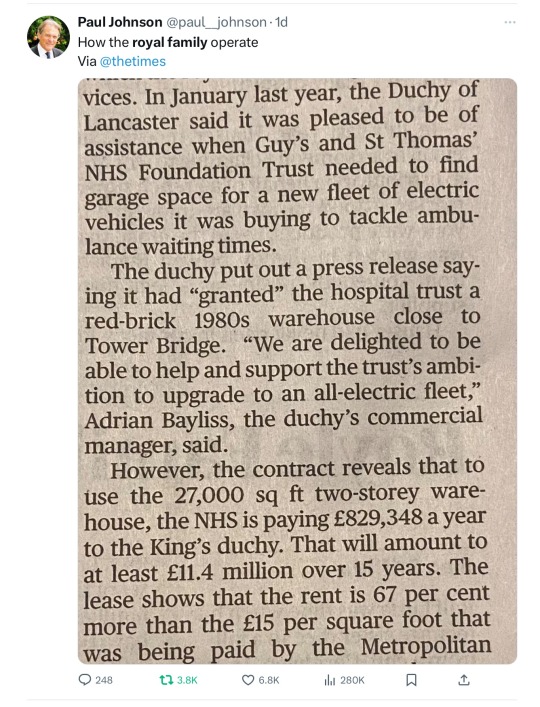
2 notes
·
View notes
Note
The Sussexes are impossible to deal with, I can see them falling out with Charles because they didn’t get exactly what they wanted right when they asked.
Trust Charles to give everything they want.
If the Sussexes are impossible to deal with, then this would never happen.
But Charles can't give the Sussexes everything they want.
He can't make Harry co-king.
He can't split Duchy of Cornwall money.
He can't bequeath Duchy of Lancaster fortunes.
He can't make the public love the Sussexes.
He can't make the public forget how the Sussexes treated The Queen and Philip in their final years.
52 notes
·
View notes
Text
Okay so for years there have been rumors that Harry truly believed he would co-reign when William became King.
There was also the rumor that when William was to inherit the Duchy of Cornwall, Harry truly intended that William would give him half of the profits.
I think there was even a rumor that when William became King, the Duchy of Cornwall was going to Harry since William would have the Duchy of Lancaster.
Now I always thought these were out of the scope because no one can be that idiotic and clueless about their own family’s history and traditions.
But then Harry did an interview for his book and he was talking about how William and Catherine got precedence and how apparently there was this royal hierarchy and it was made clear that Meghan and himself would never be at the top of said hierarchy.
At the time I thought “yeah no way he never clued in to the fact he wasn’t the most important person in the room.”
Now I’m convinced that Harry was never clued in. In fact, Harry was so clueless that he is now under the assumption that “Sussex” is a duchy and also a surname.
I’m waiting for the news that he is upset his family refuses to give him his coffers from his lowly serfs who till his fields.
150 notes
·
View notes